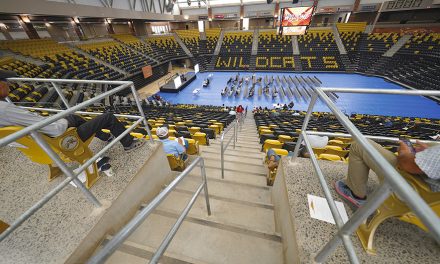
50 years ago: Council cracks down on DNA
The Navajo Tribal government really didn’t like DNA, the legal aid service operated by the Office of Navajo Economic Opportunity.
It went beyond the hatred of some members of the Navajo Tribal Council for DNA’s director, Ted Mitchell, who had recently won a federal court battle to be allowed back on reservation land. There was more to it even than the fear of future lawsuits by DNA attorneys trying to get the tribe to better protect the rights of its members.
No, according to members of the tribal Council, they really hated the fact that so many of the attorneys working for DNA came from elite law schools and felt they knew better than the tribal government what was best for the Navajo people.
Given this, what the advisory committee of the Council did this week 50 years ago should have come as no surprise to DNA officials — but it did.
The committee, by a 12-1 vote, passed a resolution ordering the tribe’s chairman, Raymond Nakai, not to seek or accept any funds from the federal government in 1970 for the operation of DNA. The resolution also called for Nakai to start looking for another program to provide legal aid to members of the tribe.
The resolution mentioned the ongoing problems with the agency and its attorneys, as well as the belief that allowing Mitchell to come back to the reservation meant that the tribe no longer had the ability to ban people who wanted to do harm to the tribe.
The federal ruling, of course, did not do that, according to the Times. It only required the tribal government to give the person who was being banned the right to due process.
The Times reported that the resolution was passed on Thursday morning and by that afternoon, Nakai had written a letter to the Office of Economic Opportunity in Washington saying he would refuse to accept any further funds for the operation of DNA.
The situation turned out to be every more dire for DNA because the tribe had not formally accepted the funding for the current year. Instead, Peter MacDonald, the head of ONEO, had been advancing the agency money from other sources with the expectation that it would be repaid when the money was released for the operation of DNA for the current year.
As this issue of the Times was going to press, there was no response from MacDonald as to whether he would continue providing funds to DNA from the other sources. Mitchell put out a statement that DNA had funds to continue operating for a couple of months.
The board of directors for DNA said it would take immediate legal action against the committee by referring the matter to the judge who ruled on the Mitchell case and claim that this was done in retaliation of his ruling.
In other news, U.S. Sen. Clinton Anderson, at the request of the Navajo government, had introduced legislation in Congress that would allow the tribe to seek funds to improve airports on the reservation.
Nakai, in a recent message to members of the tribal council, reported that most of the air strips on the reservation were in severe need of funding to make them safe for airplanes.
The only decent airport was in Window Rock but even that needed millions of dollars in improvements to bring it up to federal standards. As for the rest of the airstrips on the reservation, pilots were risking their lives to land and depart at times.
One of the major problems, he said, was livestock wandering onto the fields, especially at night when emergency aircraft often had to land to pick up patients who needed to be transported to bigger facilities for treatment.
While there had been no reports of any airplane encountering problems with livestock, Nakai said it was only a matter of time.
The students at Many Farms High School and Navajo Community College received a mention in Newsweek Magazine this week for putting on a performance of Mozart’s comic opera Cosi Fan Tutti a couple of weeks earlier.
The news magazine praised the schools for bringing culture to the reservation and Frank Hall, the principal of the high school, said students got more out of this presentation than any others presented that year.
And finally, the NCC Board of Regents passed a resolution to hire Larry Ruzow as the college’s general counsel as soon as he graduated later that year from Harvard Law School, where he was in the top 10 percent of his graduating class.
This would turn out to change Ruzow’s life as he would spend the rest of his adult life working on behalf of the Navajo people.
In a couple of years, he would partner with George Vlassis and they would become general counsel for the Navajos for the next 12 years. He and Vlassis would continue to work on various Navajo programs for the next two decades.
Ruzow is still working on Navajo matters as an attorney with the federal Office of Navajo and Hopi Indian Relocation in Flagstaff.
To read the full article, pick up your copy of the Navajo Times at your nearest newsstand Thursday mornings!
Are you a digital subscriber? Read the most recent three weeks of stories by logging in to your online account.







 Highway 264,
Highway 264, I-40, WB @ Winslow
I-40, WB @ Winslow